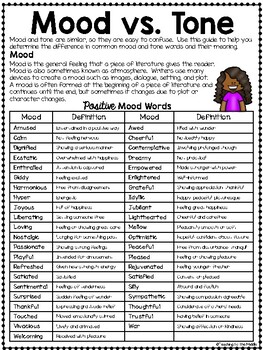

Symptoms are often triggered by a stressful situation or circumstance. What Causes Bipolar Disorder?Īlthough the exact cause is unknown, there does seem to be a genetic link, and you are more likely to get bipolar disorder if you have another family member with the condition. The severity of the mood state can also vary significantly, with some people only ever experiencing mild symptoms. The time spent in each mood state (ie, mania or depression) varies depending on the type of bipolar disorder but can range from days to months. In between mood swings, most people with bipolar disorder can lead relatively normal lives. These mood swings are much more severe than the normal ups and downs most people go through.
#List of moods full
People who don’t have full blown episodes of mania are more likely to have bipolar II disorder. Some people only develop milder symptoms of mania without psychotic symptoms. Psychotic symptoms, such as false beliefs (delusions) or false perceptions (hallucinations).Thinking that is out of step with reality.Scattered and unproductive activity sometimes with painful or embarrassing consequences.Symptoms reflect mood opposites and may include: Symptoms vary among people with bipolar disorder, depending on what type of bipolar disorder they have. What are the Symptoms of Bipolar Disorder? However, nowadays, several types of bipolar disorder are recognized: bipolar I, bipolar II, cyclothymic disorder, mixed features, and rapid-cycling disorder. The disorder used to be called manic depression or manic-depressive illness. People with bipolar disorder fluctuate from feeling down and depressed to feeling super-charged or manic. The GP will recommend the most suitable treatment programme for you.Bipolar disorder is a type of mood disorder. Treatments for SADĪ range of treatments are available for SAD. It's also possible that some people are more vulnerable to SAD as a result of their genes, as some cases appear to run in families. body's internal clock (circadian rhythm) – your body uses sunlight to time various important functions, such as when you wake up, so lower light levels during the winter may disrupt your body clock and lead to symptoms of SAD.production of serotonin – serotonin is a hormone that affects your mood, appetite and sleep a lack of sunlight may lead to lower serotonin levels, which is linked to feelings of depression.production of melatonin – melatonin is a hormone that makes you feel sleepy in people with SAD, the body may produce it in higher than normal levels.The main theory is that a lack of sunlight might stop a part of the brain called the hypothalamus working properly, which may affect the: The exact cause of SAD is not fully understood, but it's often linked to reduced exposure to sunlight during the shorter autumn and winter days. Read more about diagnosing SAD What causes SAD?
#List of moods plus
They may ask you about your mood, lifestyle, eating habits and sleeping patterns, plus any seasonal changes in your thoughts and behaviour. The GP can carry out an assessment to check your mental health. You should consider seeing the GP if you think you might have SAD and you're struggling to cope. Read more about the symptoms of SAD When to see a GP craving carbohydrates and gaining weightįor some people, these symptoms can be severe and have a significant impact on their day-to-day activities.



 0 kommentar(er)
0 kommentar(er)
